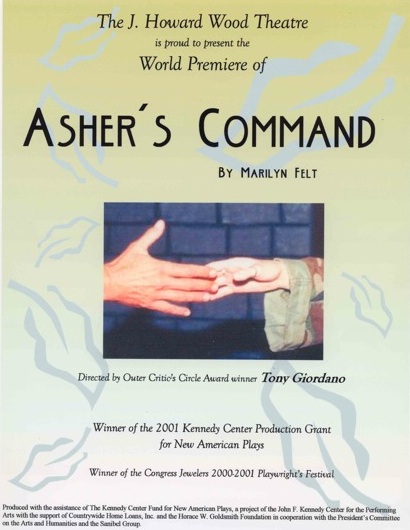Asher's Command
Asher’s Command is Marilyn’s second produced play. It is the fictionalization of an actual event/tragedy that occurred on the West Bank. Ethan Kanfer’s review in The Forward, April 2006, of the final, published version of the play describes it well:
“Lesser known [than Jeffrey Sweet and Donald Margulies, previously reviewed] but equally talented, Marilyn Clayton Felt brings a Shavian intensity to her penetrating study of the Middle East peace struggle. Inspired by true events, Asher’s Command concerns a friendship between Arab car mechanic Samir and young Israeli draftee Asher. When Asher’s car breaks down in the territories, Samir is happy to help and shows no animosity toward the young soldier. The problem turns out to be a potato jammed into the tailpipe; hardly an act of ruthless terrorism, but certainly an omen of what’s to come. The friendship continues through the years, but is put to the test in the 1980s when Asher becomes commander of occupation forces. Although he truly believes he can make a difference from within, he receives little support from either side. Arabs suspect trickery behind the peaceful overtures, and Jewish hardliners see him as a traitor to his nation. Tensions erupt when a group of Israeli youths enjoy an outing in Nablus in defiance of regulations. Stones are thrown, shots are fired and Samir’s auto shop becomes an unintended battleground. As Asher is called on to enforce the law, he ends up on the opposite side of his longtime friend. Although a melodramatic subplot proves somewhat distracting, Felt’s well-crafted allegory provides a mature and unflinching portrayal of Israel’s continuing internal and external conflicts.”
Dramatizing reality is often more difficult than creating fiction. The play had a very long gestation, going through many complete rewrites over a period of about twelve years followed by a sequence of gradual refinements.
A National Foundation for Jewish Culture (NJFC) New Play commission for Asher's Command funded five concert readings of the work-in-progress, presented by the Rainbow Theatre, directed by Ugo N. Toppo, December 7-9, 1995; four of the readings took place at the Leonhardt Studio, Rich Forum, and one at the Men's Club of Temple Beth El, both venues in Stamford, Connecticut.
Development of the play continued, aided by numerous staged readings, included one at Boston's Huntington Theatre, supported by a Massachusetts Cultural Council grant, one at the Traverse Theatre in Edinburgh, and one that won the first place prize at the 1998 Dayton (Ohio) Playhouse FutureFest theatre festival.
In 2001 the Kennedy Center Fund for New American Plays awarded production grants to the J. Howard Wood Theatre of Sanibel, Florida, and to Ms. Felt. (She was in good company, one of the other eight grants awarded that year was to Louis Sachar for Holes.) The grant supported a very successful premiere at the Wood Theatre in March, 2001, directed by Tony Giordano.
Asher's Command was published in 2005 in the anthology 9 Contemporary Jewish Plays, edited by Ellen Schiff and Michael Posnick, University of Texas Press.
In Why I Wrote Asher’s Command (PDF, 80KB), Marilyn describes her later thoughts about her play.


